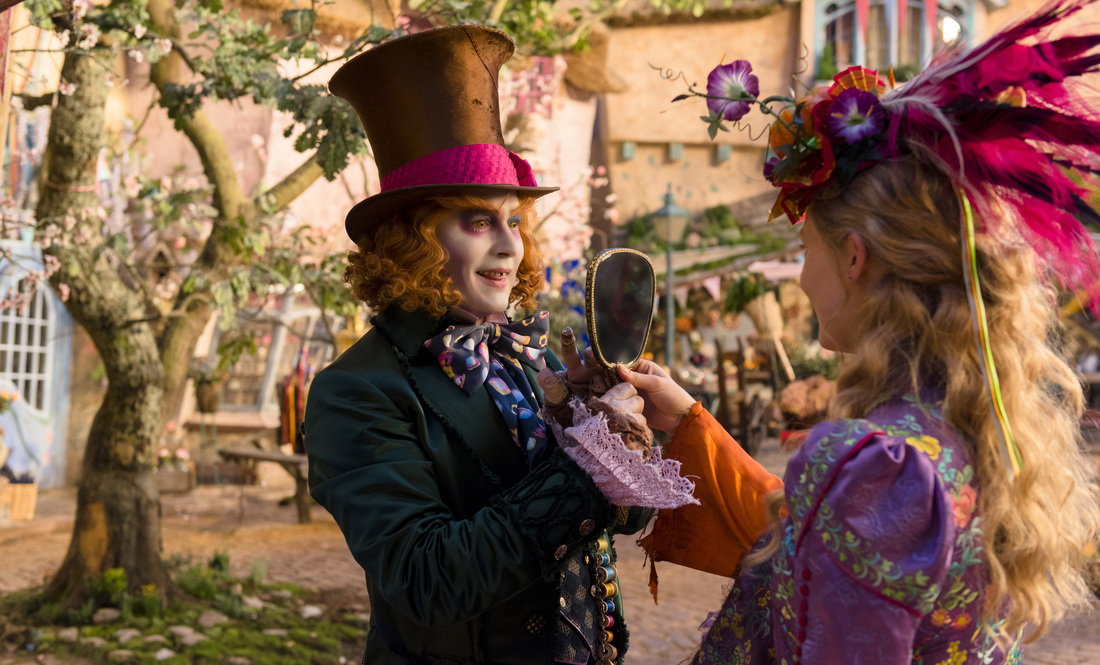Following her adventures in Wonderland (no, I refuse to call it ‘Underland’) in the previous film, Alice Kingsleigh (Mia Wasikowska- Crimson Peak and Only Lovers Left Alive) has spent three years as a ship captain exploring Asia. On her return to England she discovers that, due to the machinations of her jealous male superiors, she is out of a job and her mother faces eviction from her home. While trying to resolve these matters, Alice is once again sucked into Wonderland, where she finds her good friend the Mad Hatter (Johnny Depp) also in peril. He has been even madder than usual lately, due to becoming convinced that the other members of his family (who perished long ago) are still alive. With his health quickly deteriorating, the White Queen (Anne Hathaway) deduces that the only way to save Hatter is for Alice to travel into the past and save the Hatter’s family from their doom. But to do this, Alice will have to confront the personification of Time (Sacha Baron Cohen) and her old enemy the Red Queen (Helena Bonham Carter).
Now, I must admit that it has been some time since I read any Lewis Carrol, but I am quite sure that neither Alice’s Adventures in Wonderland nor Through the Looking Glass have time travel in them. Simply put, this film is an adaption of the latter novel essentially in name only, with virtually none of the elements (or, for that matter, charm) of the original book making it into this film. Rather, this film simply takes numerous elements and characters associated with Carrol’s novels and uses them to tell a generic fantasy story. There is neither the whimsy and surrealness so vital to the original novels nor the distinct visual style Tim Burton bestowed on the first movie. Although Burton did act as executive producer on the sequel, he handed off directorial duties (to James Bobin), and frankly it shows.
In addition to simply being generic, this movie is filled with confounding creative decisions. Why would the writers replace the excellent content of the original story with a silly time travel narrative which doesn’t even try to be consistent? Why are the first ten minutes of the movie a cheap knock-off of Pirates of the Caribbean? Why does Sacha Baron Cohen speak in a silly Russian accent which makes him sound like Ensign Chekov from Star Trek? And why, out of all the things you could write for an Alice in Wonderland adaption, would you write a story based around the Mad Hatter’s strained relationship with his father? This is especially bewildering since the film’s screenwriter, Linda Woolverton, was the writer of Beauty and the Beast and The Lion King in the Renaissance Age of Animation. Although more recently she also wrote the screenplays for the aforementioned Maleficent and this film’s immediate sequel, so I suppose not everything gets better with age.
All that being said, Alice Through the Looking Glass is not a flat-out bad movie, despite its perplexing narrative and creative decisions. Mostly, it’s just boring and generic, a flaw that can frequently be forgiven. But considering the film’s source material, which is frequently considered one of the best pieces of surreal literature ever written, being generic is probably the worst sin an adaption can commit. And if I want to see a mindless, colorful, CGI-filled blockbuster, I have a hundred other options as these movies are a dime a dozen these days (just look at the other terrible film being released today). If you want my opinion, skip this movie entirely and instead stay home and watch Disney’s original Alice in Wonderland, Jan Švankmajer’s 1988 fusion of live action and stop motion animation, American McGee’s Alice, or any of the numerous better adaptions of Carrol’s novel.
Grade: C-

 RSS Feed
RSS Feed
